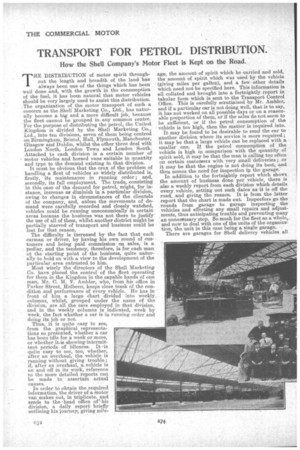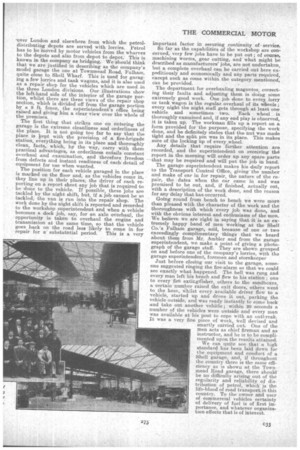TRANSPORT FOR PETROL DISTRIBUTION.
Page 10

Page 11

If you've noticed an error in this article please click here to report it so we can fix it.
How the Shell Company's Motor Fleet is Kept on the Road.
THE DISTRIBUTION of motor spirit throughout the length and breadth of the land has always been one of the things which has been well done and, with the growth in the consumption of the fuel, it has been natural that motor vehicles should be very largely used to assist this distribution. ,The organization of the motor transport of such a concern as the Shell Marketing Co., Ltd., has naturally become a, big and a, more difficult job, because the fleet cannot be grouped in any common centre. For the purpose of distributing the petrol, the United Kingdom is divided by the Shell Marketing Co.,Ltd., into ten divisions, seven of them being centre on Birmingham, Bristol, Hull, Plymouth, Manchester, Glasgow and Dublin, whilst the other three deal with London North, London Town and London South. Attached to each division is a certain number of motor vehicles and horsed vans suitable in quantity and type to the demand existing in that division. It must be obvious that the crux of the problem of handling a fleet of vehicles so widely distributed is, firstly, its maintenance in running order ; and, secondly, its full employment. The trade, consisting in this case of the demand for petrol, might, for instance, increase or diminish in a particular division, owing to changes in circumstances of the clientele of the company, and, unless the movements of demand were carefully recorded and closely watched, vehicles could be running uneconomically in certain areas because the business was not there to justify the use of all of them, whilst another district might be partially starvedof transport and business could be lost for that reason.
The difficulty is increased by the fact that each carman or driver, by having his own round of customers and being paid commission on sales, is a pedlar, and the tendency, therefore, is for each man at the starting point of the business, quite naturally to hold on with a view to the development of the particular area entrusted to him. Most wisely the directors of the Shell Marketing Co. have placed the control of the fleet operating for them in the Kingdom in the capable hands of one man, Mr. C. M. V. Ambler, who, from his office in Parker Street, Holborn, keeps close track of the condition and performance of every vehicle. He has in front of him a large chart divided into weekly columns, whilst, grouped under the name of the division, are all the cars employed in that division, and in the weekly columns is indicated, week by week, the fact whether a car is in running order and doing its job or not Thus, it is quite easy to see, from the graphical representa tions so presented, whet er a car has been idle for a week or more, or whether itis showing,interraittent periods of idleness. It ,is quilie easy to see, too, whether, after an overhaul, the vehicle is running without giving trouble; if, after an overhaul, a,vehicle is on and off in its work, reference to the more detailed reports can be made to ascertain actual causes.
In order to obtain the required information, the driver of a motor van makes out, in triplicate, and sends to the head office of s. his division, a daily report briefly outlining his journey, giving mile age, the amount of spirit which he carried and sold, the amount of spirit which was used by the vehicle (giving miles per gallon), and a few other details which need not be specified here. This information is all collated and brought into a fortnightly report in tabular form which is sent to the Transport Control Office. This is carefully scrutinized by Mr. Ambler, and if a particular car is not doing well, that is to say, it has not worked on all possible days or on a reasonable proportion of them, or if the sales do not seem to be sufficient, or if the petrol consumption of the vehicle is too high, then the matter is inquired into. It may be found to be desirable to send the car to another division where its service is more required ; it may be that a large vehicle can be replaced with a smaller one. If the petrol consumption of the vehicle is high in comparison with the quantity of spirit sold, it may be that the man is calling too often on certain customers with very small deliveries; or it may be that the engine is not doing its best, and then comes the need for inspection in the garage. In addition to the fortnightly report which shows the amount of business done per vehicle, there is also a weekly report from each division which details every vehicle, setting out such dates as it is off the road, and giving the reason. It is from the latter report that the chart is made out. Inspeciors go the rounds from garage to garage inspecting the vehicles and effecting any small repairs and adjustments, thus anticipating trouble and preventing many an unnecessary stop. So much for the fleet as a whole, and now to deal with one of the units of the orga,nization, the unit in this case being a single garage. There are garages for Shell delivery vehicles all over London and elsewhere from which the petroldistributing depots are served with lorries. Petrol has to be Moved by motor vehicles from the wharves to the depots and also from depot to depot: This is known in the company as bridging. We should think that we are justified in describing as the company's model garage the one at Townmead Road, Fulham, quite close to Shell Wharf. This is used for garaging a few lorries and tank wagons, and it is also used as a repair shop for the vehicles which are used in the three London divisions. Our illustrations show the left-hand side of the interior of the garage portion, whilst there are three views of the repair shop section, which is divided off from the garage portion by a 9 ft. fence, the superintendent's office being raised and giving him a clear view over the whole of the premises.
The first thing that strikes one on entering the garage is the extreme cleanliness and orderliness of the place. It is not going too far to say that the place is kept with the precision of a fire-brigade station, everything being in its place and thoroughly clean, facts, which, by the way, carry with them practical advantages, as orderliness entails constant overhaul .and examination, and therefore freedom from defects and instant readiness of each detail of equipment for use when wanted.
The position for each vehicle garaged in the place is marked on the floor and, as the vehicles come in, they line up in their places, the driver of each reporting on a report sheet any job that is required to be done to the vehicle. If possible, these jobs are tackled by the night shift, but, if a. job cannot be so tackled, the van is run into the repair shop. The work done by the night shift is reported and recorded to the workshop superintendent and when a vehicle becomes a dock job, say, for an axle overhaul, the opportunity is taken to overhaul the engine and transmission at the same time, so that the vehicle goes hack on the road less 'likely to come in for repair for a substatntial period. This is a very important factor in securing continuity of service. So far as the capabilities of the workshop are concerned, very few jobs have to be put out ; of course, machining worms, gear cutting, and what might be described as manufacturers' jobs, are not undertaken, but a complete overhaul can be carried out here ex peditiously and economically and any parts required, except such as come within the category mentioned, can be provided.
The department for overhauling magnetos, correcting their faults and adjusting them is doing some extremely good work. One job done to every lorry or tank wagon is the regular overhaul of its wheels ; every night the night staff gets through at least one vehicle and sometimes two. Each wheel is thoroughly examined and, if any end play is observed, it is taken up. The workman fills up a report on a form provided for the purpose, specifying the work done, and he definitely states that the nut was made tight and the split pin was in its place. This makes sure of the locking up of every wheel.
Any details that require further attention are recorded, and the superintendent on receiving the report in the morning will order up any spare parts. that may be required and will put the job in hand. The garage superintendent makes his daily report to the Transport Control Office, giving the number and make of car in for repair, the nature of the repair, the dates when the car came in and was promised to be out, and, if finished, actually out, with a description of the work done, and the reason for any delay that has occurred. Going round from bench to bench we were more than pleased with the character of the work and the thoroughness with which every job was done, and with the obvious interest and enthusiasm of the men. We believe we are right in saying that it is an extremely happy band of men working at the Shell • Co.'s Fulham garage, and, because of one or two exceedingly complimentary things that we heard about them from Mr. Ambler and from the garage superintendent, we make a point of giving a photograph of the garage staff. They are shown grouped on and before one of the company's lorries, with the garage superintendent, foremen arid storekeeper Just before closing our visit to the garage, someone suggested ringing the fire-alarm so that we could see exactly what happened. The bell was rung and every man left his bench and flew to his station ; one to every fire extingifisher, others to the sandboxes, a certain number raised the exit doors, others went to the hose, whilst every available driver flew to a vehicle, started up and drove it out, parking the vehicle outside, and was ready instantly to come back and take out another vehible ; within 20 seconds a number of the vehicles were outside and every man was available at his post to cope with an outbreak. It. was a very fine piece of Work, .Well devised and smartly carried out. One of the men acts as chief fireman and as instructor, and he is to be complimented upon the results attained.
We can quite see that a high standard has been laid down for the equipment and conduct of a Shell garage, and, if throughout the country there is the same efficiency as is shown at the Townmead Road garage, there should be no difficulty arising out of the regularity and reliability of distribution of petrol, which is the life-blood of road transport in this country. To the owner and user of commercial vehicles certainty of delivery of fuel is of first impertanoe, and whatever organization effects that is of interest.






















